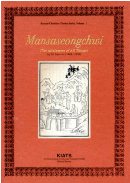Addison, James Thayer. “Chinese Ancestor Worship: A Study of Its Meaning and Its Relations with Christianity.” The Church Literature Committee of the Chung Hua Sheng Kung Hui, 1925.
Baker, Donald. “Examining Tonghak: The First Organized Indigenous Religion in Korea,” Harvard Journal of Asiatic Studies (Dec. 2015): 427-440.
Baynes, Thomas Spencer. ed. “Religions” Encyclopedia Britannica (New York: Henry G. Allen & Co., 1888), 358-371.
Cho Hung-youn. “Cultural Interbreeding between Korean Shamanism and Imported Religions.” Diogenes (Sept. 1999): 50-61.
 Chung, Chai-sik.A Korean Confucian Encounter with the Modern World: Yi Hang-No and the West. Berkeley, CA: Institute of East Asian Studies, University of California, 1995.
Chung, Chai-sik.A Korean Confucian Encounter with the Modern World: Yi Hang-No and the West. Berkeley, CA: Institute of East Asian Studies, University of California, 1995.
——–. The Encounter Between the Gospel and Neo-Confucian Culture, Geneva: WCC, 1997.
 Chung, David. Syncretism: The Religious Context of Christian Beginnings in Korea. Albany, NY: State University of New York Press. 2001.
Chung, David. Syncretism: The Religious Context of Christian Beginnings in Korea. Albany, NY: State University of New York Press. 2001.
Editor of the Homiletic Review. “Pleas of Japanese Buddhists,” Homiletic Review (June 1901): 568-569.
Ellinwood, Frank F. Oriental Religions and Christianity. New York: Scribners, 1892.
 Elman, Benjamin A., Duncna, John B., Ooms, Herman eds. Rethinking Confucianism: Past and Present in China, Japan, Korea, and Vietnam. Los Angles: UCLA, 2002.
Elman, Benjamin A., Duncna, John B., Ooms, Herman eds. Rethinking Confucianism: Past and Present in China, Japan, Korea, and Vietnam. Los Angles: UCLA, 2002.
Faber, Ernst. “Genesis and Development of Confucianism,” The World’s Parliament of Religions Vol. 2. 1350-1353. Chicago: Parliament’s Publishing, 1893
Gifford, Daniel L. “Ancestral Worship as Practiced in Korea.” Korean Repository I (June, 1892): 169-176.
Grayson, James H. “Christianity and State Shinto in Colonial Korea: A Clash of Nationalism and Religious Beliefs,”Diskus 1/2 (1993):13-30.
——–. Early Buddhism and Christianity in Korea: A Study in the Emplantation. Brill Academic Publication, 1997.
——–. Korea–A Religious History. Routledge; Revised edition, 2002.
Junkin, William M. “The Tong Hak.” Korean Repository II (February 1895): 56-61.
Hall, Charles Cuthbert. The Universal Elements of the Christian Religion: An Attempt to interpret Contemporary Religious Conditions. New York: F. H. Revell, 1905./span>
——–. Christ and the Eastern Soul: The Witness of the Oriental Consciousness to Jesus Christ. Chicago: University of Chicago Pres, 1909.
Holcomb, Helen H. Men of Might in India Missions: The Leaders of Their Epochs, 1706-1899. New York: F. H. Revell, 1901.
Hong,Sung Wook, Naming God in Korea: The Case of Protestant Christianity. Wipf & Stock Publishers. April 2009.
Kellogg, Samuel Henry. The Genesis and Growth of Religion . New York and London: Macmillan, 1892.
 Kil Sôngju, 만사성취 Masaseongchwi[Attaining All Things], 1916. tr. byDeberniere J. Torrey. Seoul: KIATS, Jan. 2008.
Kil Sôngju, 만사성취 Masaseongchwi[Attaining All Things], 1916. tr. byDeberniere J. Torrey. Seoul: KIATS, Jan. 2008.Kim, Kyoungjae 김경재. Christianity and the Encounter of Asian Religions: Method of Correlation, Fusion of Horizons, and Paradigm Shifts in the Korean Grafting Process. Zoetermeer, Netherlands: Uitgeverji Boekencentrum, 1995.
Kim, Sanggeun 김상근. Strange Names of God: The missionary translation of the divine name and the Chinese responses to Matteo Ricci’s Shangti in Late Ming China, 1583-1644. New York, Peter Lang, 2004.
Kim, Sunghae and Heisig, James W. eds. Monasticism Buddhist and Christian: The Korean Experience. Eerdmans Publishing Company, 2008. Book review by Keenth Lee
Landis, E.B. “Geomancy in Korea,” Korean Repository V (February 1898): 41-46.
Byungohk Lee, “A Missional Hermeneutic of the Other: A Dialogue between Levinas and Confucianism,” Missiology (June 2013): 416-426.
Lee, Choongsoon 이중순. Alfred North Whitehead and Yi Yulgok: Toward a Process-Confucian Spirituality in Korea, University Press of America, 2006.
Lee, Jonghyun, “Shamanism and Its Emancipatory Power for Korean Women,” Affilia (May 2009); 186-198.
Lee, Jung Young이정용. Korean Shamanistic Rituals. New York: Mouton, 1981.
Lee, Jung Yong ed. Ancestor Worship and Christianity in Korea. Lewiston: Edwin Mellen Press, 1988.
Lee, Peter K [Li Jingxiong] 李景雄. Confucian-Christian encounters in historical and contemporary perspective. Lewiston, NY: E. Mellen Press, 1991.
Lee, Zuk-Nae. “Korean Culture and Sense of Shame,” Transcultural Psychiatry (June 1999): 181-194.
Legge, James. Religions of China: Confucianism and Taoism Described and Compared with Christianity New York: Fleming H. Revell, 1880.
Lew, Young Ick 류영익. “Late Nineteenth-Century Korean Reformers’ Receptivity to Protestantism: The Case of Six Leaders of the 1880s and 1890s Reform Movements,” Asian Culture 4 (1988): 153-196.
Mong, Ambrose Ih-Ren. “The legacy of Matteo Ricci and his Companions,” Missiology (July 2015): 385-397.
Nevius, John L. Demon Possession and Allied Themes. New York: F. H. Revell, 1896.
Oh, Sanghak 오상학, “The Recognition of Geomancy by Intellectuals during the Joseon Period,” Review of Korean Studies 13-1 (March 2010): 121-147.
Ohlinger, Franklin. “How Far Should Christians be Required to Abandon Native Customs,” Report of the General Conference of the Protestant Missionaries of China (Shanghai: American Presbyterian Mission Press, 1890), 603-609.
Paik, Jong-Koe 백종구. Constructing Christian Faith in Korea: The Earliest Protestant Mission and Ch’oe Pyŏng-hŏn. Zoetemrmeer: Uitgeverij Boekencentrum, 1998.
 Palmer, Spencer J. Korea and Christianity. Seoul: Hollym Corporation, 1967.
Palmer, Spencer J. Korea and Christianity. Seoul: Hollym Corporation, 1967.
Park, Jin Y. “Wŏn Buddhism, Christianity, and Interreligious Dialogue,” Journal of Korean Religions (April 2014): 109-131.
Park, Mijung, Catherine Chesla, “Revisiting Confucianism as a Conceptual Framework for Asian Family Study,” Journal of Family Nursing (Aug. 2007): 293-311.
Ro, Kil-myung 노길명. “New Religions and Social Change in Modern Korea History,” Review of Korean Studies 5.1 (June 2002): 31-62.
Shim, Jae-ryong. “Buddhism and the Modernization Process in Korea,” Social Compass (Dec. 2000): 541-548.
Shin, Kisôn, 儒學經緯 Yuhak Kyŏngwi [The Warp and Woof of Confucianism]. Seoul: Hakpu, 1896.
 Stanley, Brian. The World Missionary Conference, Edinburgh 1910. Grand Rapids, MI: Eerdmans, 2009.
Stanley, Brian. The World Missionary Conference, Edinburgh 1910. Grand Rapids, MI: Eerdmans, 2009.
Underwood, H. G. The Religions of Eastern Asia. New York: McMillan, 1910.
Sung Hyun Yun, “An analysis of Confucianism’s yin-yang Harmony with Nature and the Traditional Oppression of Women: Implications for Social Work Practice,” Journal of Social Work (March 2012); 582-598.